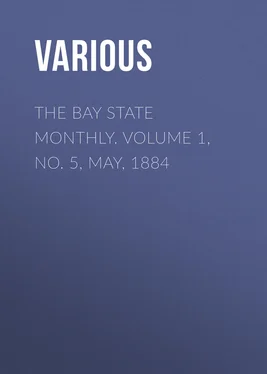Various - The Bay State Monthly. Volume 1, No. 5, May, 1884
Здесь есть возможность читать онлайн «Various - The Bay State Monthly. Volume 1, No. 5, May, 1884» — ознакомительный отрывок электронной книги совершенно бесплатно, а после прочтения отрывка купить полную версию. В некоторых случаях можно слушать аудио, скачать через торрент в формате fb2 и присутствует краткое содержание. Жанр: foreign_antique, periodic, foreign_edu, на английском языке. Описание произведения, (предисловие) а так же отзывы посетителей доступны на портале библиотеки ЛибКат.
- Название:The Bay State Monthly. Volume 1, No. 5, May, 1884
- Автор:
- Жанр:
- Год:неизвестен
- ISBN:нет данных
- Рейтинг книги:4 / 5. Голосов: 1
-
Избранное:Добавить в избранное
- Отзывы:
-
Ваша оценка:
- 80
- 1
- 2
- 3
- 4
- 5
The Bay State Monthly. Volume 1, No. 5, May, 1884: краткое содержание, описание и аннотация
Предлагаем к чтению аннотацию, описание, краткое содержание или предисловие (зависит от того, что написал сам автор книги «The Bay State Monthly. Volume 1, No. 5, May, 1884»). Если вы не нашли необходимую информацию о книге — напишите в комментариях, мы постараемся отыскать её.
The Bay State Monthly. Volume 1, No. 5, May, 1884 — читать онлайн ознакомительный отрывок
Ниже представлен текст книги, разбитый по страницам. Система сохранения места последней прочитанной страницы, позволяет с удобством читать онлайн бесплатно книгу «The Bay State Monthly. Volume 1, No. 5, May, 1884», без необходимости каждый раз заново искать на чём Вы остановились. Поставьте закладку, и сможете в любой момент перейти на страницу, на которой закончили чтение.
Интервал:
Закладка:
Returning to New York, General Arthur was welcomed by a large and influential gathering of Republicans, who greeted him with hearty cheers. That night he was serenaded by a large procession of Republicans, which assembled in Union Square and marched past his residence in Lexington Avenue, with music and fireworks. A few weeks later, a letter was addressed to him, signed by Hamilton Fish, Noah Davis, and upwards of a hundred other prominent Republicans, inviting him to dine with them at the Union League Club, and stating that, in common with all true Republicans, they rejoiced at the happy issue of the earnest struggle in the Chicago convention. They hailed the general approval of its work as an auspicious omen, and looked forward confidently to the labors of the canvass. They felt an especial and personal gratification in the fact that the ticket selected at Chicago bore his name. His faithfulness in public duties, his firmness and sagacity in political affairs, so well understood by his fellow-citizens in New York, had met with national recognition and won for him this well-deserved honor. Their efforts in his support would be prompted, not only by personal zeal and enthusiasm, but by the warmth and zeal of strong personal friendship and esteem. That they might have an opportunity more fully to express to him their sincere congratulations and hearty good wishes, they invited him to meet them at dinner at the Union League Club.
General Arthur, in acknowledging the receipt of this letter, expressed his sense of the kindness which had prompted both the invitation itself and the flattering assurances of confidence and regard by which it was accompanied. If circumstances had permitted, he should have been pleased to have accepted the proffered hospitality, and for that purpose no more congenial spot could have been selected than the headquarters of the Union League Club, an association so widely famed for its patriotic zeal and energy, and so efficient in the support of the principles and policy of the Republican party. He was constrained, however, from considerations of a private nature known to many, to decline the invitation.
On the fifteenth of July, 1880, General Arthur formally accepted the position assigned to him by the Chicago convention, and expressed at length his own personal views on the election laws, public service appointments, the financial problems of the day, common schools, the tariff, national improvements, and a Republican ascendency, saying, in conclusion, that he did not doubt that success awaited the Republican party, and that its triumph would assure a just, economical, and patriotic administration.
The political campaign of 1880 was earnestly contested by the great political parties. The Republicans were victorious, and their ticket bearing the names of Garfield and Arthur was triumphantly elected. On the fourth of March, 1881, General Arthur took the oath of office in the Senate Chamber as Vice-President of the United States, and half an hour later General Garfield was inaugurated on a platform before the east front of the Capitol, in the presence of the imposing military and civil procession which had escorted him with music and banners. When the ceremony was concluded, the distinguished personages around the new President tendered their congratulations, the assembled multitude cheered, and a salute fired by a light battery stationed near by was echoed by the guns at the navy yard, the arsenal, and the forts around the metropolis.
Republicans congratulated each other on the indications of a vigorous administration, governed by a conscientious determination to promote harmony. But a few months had elapsed, however, before President Garfield was cruelly assassinated, in the full vigor of his manhood, and the Republican party was at first stricken with apprehensions. These gloomy doubts, however, soon disappeared as the incidents of Mr. Arthur's patriotic and useful life were recalled, and a generous confidence was soon extended to the new President.
President Arthur took the oath of office in New York immediately after the death of General Garfield, and he repeated it in the Capitol on the twenty-second of September, in the Vice-President's room. The members of General Garfield's cabinet, who had been requested by his successor to continue for the present in charge of their respective departments, were present, with General Sherman in full uniform, ex-Presidents Hayes and Grant, and Chief Justice Waite in his judicial robes, escorted by Associate Justices Harlan and Matthews. There were, also, present Senators Anthony, Sherman, Edmunds, Hale, Blair, Dawes, and Jones, of Nevada, and Representatives Amos Townsend, McCook, Errett, Randall, Hiscock, and Thomas. Ex-Vice-President Hamlin, of Maine, and Speaker Sharpe, of New York, were also present.
When President Arthur entered the room, escorted by General Grant and Senator Jones, he advanced to a small table, on which was a Bible, and behind which stood the Chief Justice, who raised the sacred volume, opened it, and presented it to the President, who placed his right hand upon it. Chief Justice Waite then slowly administered the oath, and at its conclusion the President kissed the book, responding, "I will, so help me God." He then read the following address:—
For the fourth time in the history of the Republic its Chief Magistrate has been removed by death. All hearts are filled with grief and horror at the hideous crime which has darkened our land; and the memory of the murdered President, his protracted sufferings, his unyielding fortitude, the example and achievements of his life and the pathos of his death, will forever illumine the pages of our history. For the fourth time the officer elected by the people and ordained by the Constitution to fill a vacancy so created is called to assume the executive chair. The wisdom of our fathers, foreseeing even the most dire possibilities, made sure that the Government should never be imperiled because of the uncertainty of human life. Men may die, but the fabrics of our free institutions remain unshaken. No higher or more assuring proof could exist of the strength and permanence of popular government than the fact that, though the chosen of the people be struck down, his constitutional successor is peacefully installed without shock or strain except the sorrow which mourns the bereavement. All the noble aspirations of my lamented predecessor which found expression in his life, the measures devised and suggested during his brief administration to correct abuses and enforce economy, to advance prosperity and promote the general welfare, to insure domestic security and maintain friendly and honorable relations with the nations of the earth, will be garnered in the hearts of the people, and it will be my earnest endeavor to profit, and to see that the Nation shall profit, by his example and experience. Prosperity blesses our country; our fiscal policy is fixed by law, is well grounded, and generally approved. No threatening issue mars our foreign intercourse, and the wisdom, integrity, and thrift of our people may be trusted to continue undisturbed the present assured career of peace, tranquillity, and welfare. The gloom and anxiety which have enshrouded the country must make repose especially welcome now. No demand for speedy legislation has been heard. No adequate occasion is apparent for an unusual session of Congress. The Constitution defines the functions and powers of the executive as clearly as those of either of the other two departments of the government, and he must answer for the just exercise of the discretion it permits and the performance of the duties it imposes. Summoned to these high duties and responsibilities, and profoundly conscious of their magnitude and gravity, I assume the trust imposed by the Constitution, relying for aid on Divine guidance and the virtue, patriotism, and intelligence of the American people.
Читать дальшеИнтервал:
Закладка:
Похожие книги на «The Bay State Monthly. Volume 1, No. 5, May, 1884»
Представляем Вашему вниманию похожие книги на «The Bay State Monthly. Volume 1, No. 5, May, 1884» списком для выбора. Мы отобрали схожую по названию и смыслу литературу в надежде предоставить читателям больше вариантов отыскать новые, интересные, ещё непрочитанные произведения.
Обсуждение, отзывы о книге «The Bay State Monthly. Volume 1, No. 5, May, 1884» и просто собственные мнения читателей. Оставьте ваши комментарии, напишите, что Вы думаете о произведении, его смысле или главных героях. Укажите что конкретно понравилось, а что нет, и почему Вы так считаете.












